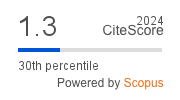Antibacterial effects of 70% ethanol and water extract of cacao beans (Theobroma cacao L.) on Aggregatibacter actinomycetemcomitans
Downloads
Downloads
Carranza P, Klokkevold F, Newman M, Takei H. Carranza's clinical periodontology. St. Louis, MO: Saunders Elsevier; 2009. p. 187- 192
Riset Kesehatan Dasar (Riskesdas) Nasional. Jakarta: Badan Penelitan dan Pengembangan Kesehatan, Departemen Kesehatan Republik Indonesia; 2013. p. 113.
Chauhan VS, Chauhan RS, Devkar N, Vibhute A, More S. Gingival and periodontitis diseases in children and adolescents. J Dent & Allie Sci 2012 ; 1(1): 26.
Newman M, Takei H, Klokkevold P, Carranza F. Carranza's clinical periodontology. St. Louis, MO: Saunders Elsevier; 2012. p. 185-93.
Umeda EJ, Priscila LL, Maria RL, Marcia PAM. Differential transcription of virulence genes in Aggregatibacter actinomycetemcomitans serotypes. Brazil: Departement of microbiology, Institute of Biomedical Sciences, University of Sao Paulo; 2013. p. 4-6.
Gu F, Tan L, Wu H, Fang Y, Xu F, Chu Z, Wang Q. Comparison of cocoa beans from China, Indonesia and Papua New Guinea. Foods 2013; 2(2): 183-97.
Misnawi. Pemanfaatan Biji Kakao sebagai Sumber Antioksidan Alami. Jember: Pusat Penelitian Kopi dan Kakao Indonesia; 2005. p. 6.
Arlorio M, Coisson JD, Travaglia F, Varsaldi F, Miglio G, Lombardi G, Martelli A. Antioxidant and biological activity of phenolic pigments from Theobroma cacao hulls extracted with supercritical CO2. Food Research International 2005; 38(8-9): 1009-14.
Hii CL, Law CL, Suzannah S, Misnawi, Cloke M. Polyphenols in cocoa (Theobroma cacao L.). As J Food Ag-Ind 2009; 2(04): 702-22.
Sulistyowati, Misnawi. Effects of alkali concentration and conching temperature on antioxidant activity and physical properties of chocolate. International Food Research Journal 2008; 15(3): 297-304.
Lee SY, Yoo SS, Lee MJ, Kwon IB, dan Pyun YR. Optimization of Nib Roasting in Cocoa bean processing with lotte-better taste and color process. Food Sci Biotechnol 2001; 10: 286-93.
Purnamasari DA, Munadziroh E, Yogiartono RM. Konsentrasi ekstrak biji kakao sebagai material alam dalam menghambat pertumbuhan Streptococcus mutans. Jurnal PDGI 2010; 59(1): 14-8.
Gianmaria F. Ferrazzano, Ivana Amato, Aniello Ingenito, Antonino De Natale, Antonino Pollio. Anti-cariogenic effects of polyphenols from plant stimulant beverages (cocoa, coffee, tea). Fitoterapia 2009; 80(5): 255–262
John NA, Fang Z, Kebitsamang JM, Mohamed LB, Camel L. Quantification of Total Polyphenolic Content and Antimicrobial Activity of Cocoa (Theobroma cacao L.) Bean Shells. Pakistan Journal of Nutrition 2012; 11(7): 574-579
Manuchair Ebadi. Pharmacodynamic basic of herbal medicine. 2nd ed. New york: Taylor & Francis; 2007.p. 647.
Darmono. Farmasi forensik dan toksikologi. Jakarta: UI Press; 2009. p. 23.
Boakye S. Levels of selected pesticide residues in cocoa beans From Ashanti and Brong Ahafo Regions of Ghana. Dissertation. Ghana: Faculty of Physicial Science College of Science; 2012.
Smullen J, Koutsou GA, Foster HA, Zumbe A,Storey DM. The antibacterial activity of plant extract containing polyphenols against Streptococcus mutans. Caries Res 2007; 41: 342-9.
Mejos Jay Al, CaraignJ.W, De Pano J, Labador AV, Macapagal EM. Bacterial colony isolation using serial dilution techniques. Quezon City: Institute of Biology, College of Science, University of the Phillipines; 2010. p. 6.
Seeley HW, VanDemark PJ. Selected exercises from microbes in action a laboratory manual of microbiology. 3 rd ed. Sanfrancisco: Freeman and Company; 1981. p. 37-41.
V.S.T. Saito, T.F. dos Santos, C.G. Vinderola, C. Romano, J.R. Nicoli, L.S. Araújo, M.M. Costa, J.L. Andrioli, A.P.T. Uetanabaro. Viability and Resistance of Lactobacilli Isolated from Cocoa Fermentation to Simulated Gastrointestinal Digestive Steps in Soy Yogurt. Journal of food and science 2014; 79(2): doi. 10.1111/1750-3841.12326.
Kenneth T. Structure and function of bacterial cells. Online Textbook of Bacteriology2009; 5.
Zainal H, Made A, Kasno, Anggraini AD. Uji aktivitas antibakteri propolis lebah madu Trigona spp. Prosiding Seminar Nasional Indonesia, 2006; p. 204-14.
Ariza BTS, Mufida D, Fatima N. In vitro antibacterial activity of cocoa ethanolic extract against Escherichia coli. International Food Research Journal 2014; 21(3): 935-40.
Misnawi, Wulandari P, Suswati E, Rianul A. Antibacterial effect of ethanol extract cocoa beans (Theobroma cacao) on growth in vitro By Shigella dysentriae. Jurnal Medika Planta 2012; 1(5): 73.
Sabir A. Aktivitas antibakteri flavonoid propolis Trigona sp terhadap bakteri Streptococcus mutans (in vitro). Majalah Kedokteran Gigi (Dental Journal) 2005; 38(2): 135-41.
Chinami Hirao, Eisaku Nishimura, Masanori Kamei, Tomoko Ohshima, Nobuko Maeda. Antibacterial effects of cocoa on periodontal pathogenic bacteria. Journal of Oral Biosciences 2010; 52(3): 283-291.
Duskova M, Karpiskova R. Antimicrobial resistance of Lactobacilli Isolated from food. Czech J Food Sci 2013; 31(1): 27-32.
Surbhi Leekha, Christine L. Terrell, and Randall S. Edson. General principles of antimicrobial therapy. Mayo Clin Proc 2011;86(2): 156–167.
Akinyemi KO, Oluwa OK, Omomigbehin EO. Antimicrobial activity of crude extracts of three medicinal plants used in south-west Nigerian folk medicine on some food borne bacterial pathogens. African Journal of Traditional, Complementary and Alternative Medicines 2006; 3(4): 13-22.
- Every manuscript submitted to must observe the policy and terms set by the Dental Journal (Majalah Kedokteran Gigi).
- Publication rights to manuscript content published by the Dental Journal (Majalah Kedokteran Gigi) is owned by the journal with the consent and approval of the author(s) concerned.
- Full texts of electronically published manuscripts can be accessed free of charge and used according to the license shown below.
- The Dental Journal (Majalah Kedokteran Gigi) is licensed under a Creative Commons Attribution-ShareAlike 4.0 International License

















